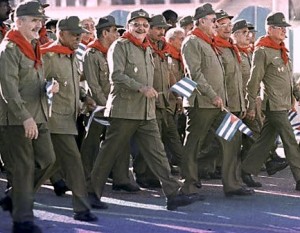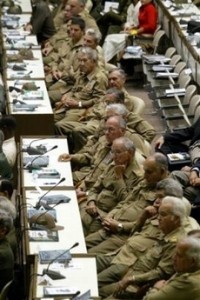 HAVANA, Cuba, September, Luis Cino, www.cubanet.org — Those who restored capitalism in Russia rose from the ranks of the Communist nomenklatura. High-level bureaucrats, officials and generals made immense fortunes appropriating the assets of the state during the process of economic privatization that led to the dissolution of the Soviet Union. The cases of Roman Abramovich and Mikhail Khodorkovsky, former comrades turned multi-millionaires, are two such examples.
HAVANA, Cuba, September, Luis Cino, www.cubanet.org — Those who restored capitalism in Russia rose from the ranks of the Communist nomenklatura. High-level bureaucrats, officials and generals made immense fortunes appropriating the assets of the state during the process of economic privatization that led to the dissolution of the Soviet Union. The cases of Roman Abramovich and Mikhail Khodorkovsky, former comrades turned multi-millionaires, are two such examples.
It is possible that something similar could happen if Castro-ism has a soft landing, as seems likely to happen, and is transformed into something else which, by virtue of being different, will be less bad in terms of public well-being and political freedoms.
But what could also happen is that, as apparatchiks and generals start filing their teeth over the prospect of burying Castro-ism, the Helms-Burton Act could prevent them from diggings its grave.
According to Title III of the law, which deals with protection of property rights of American nationals, the assets expropriated after Fidel Castro’s revolution — including those of Cuban exiles who have acquired American citizenship — would have to be returned by any government that succeeds the current regime as a condition for American diplomatic recognition and a lifting of the embargo.
After property is returned and people are compensated, it is quite possible that very little of the loot will be left over for “the corrupt bureaucrats, whose jobs were secured through calculation and opportunism, who use their positions to accumulate fortunes, betting on an eventual demise of the revolution,” as General Raúl Castro put it in an address to the National Assembly of People’s Power in December, 2011.
 This is the idea the government would like to plant among its supporters who are hoping for the grand prize and Putinism in the tropics. It wants to convince them that burying Castro-ism is not in their interests, that they would be better off digging in, remaining loyal, being satisfied with what they already have and what they can steal. It wants to convince them that they should never exaggerate, that they should play dumb lest the General Accounting Office nab them.
This is the idea the government would like to plant among its supporters who are hoping for the grand prize and Putinism in the tropics. It wants to convince them that burying Castro-ism is not in their interests, that they would be better off digging in, remaining loyal, being satisfied with what they already have and what they can steal. It wants to convince them that they should never exaggerate, that they should play dumb lest the General Accounting Office nab them.
But the chiefs do not have to go along. The players who want to break open the capitalist piñata at the expense of the state know all too well the risks they face. And the possibilities as well. They even know where to stretch their feet and put their hands. Accustomed to shady deals and a shopkeeper’s economy, they are patient, astute and make do with what they can steal… for now. They have begun accumulating capital, knowledge and relationships. After dealing with them for so long, many foreign entrepreneurs prefer to deal with them over the good guys, even if they completely lack the know-how. These players have neither class nor moral scruples but they do have a strong hand, which allows them to maintain order and get Cubans to work like slaves without complaint.
The Helms Burton Act placates the most hard-line exile factions and serves the Castro regime by allowing it to portray itself as the victim. It is not, however, of much concern to today’s players, who hope to be tomorrow’s oligarchs. In a post-Castro scenario this law will be almost pointless. Events, once they are set in motion, will make it irrelevant. And then the players will be the mafiosi of the piñata, ready to parachute into any given situation with anyone who presents himself. But they will not exactly be working as doormen, security screeners or bodyguards. They know, of course, they will not be able to afford multi-million dollar yachts, real estate in La Luna or mansions in Silicon Valley. They are not fools. Their aspirations are more modest. They better than anyone know in what state they have left the country.
By Luis Cino — luicino2012@gmail.com
From Cubanet
9 September 2013
